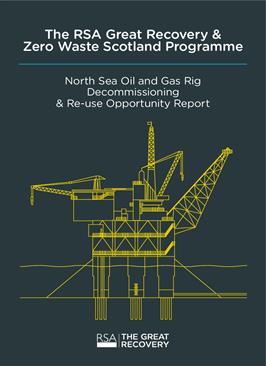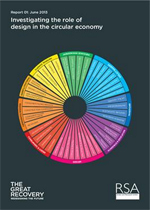The Oil & Gas (O&G) industry is a key economic sector in Scotland, and studies have identified that it has significant circular economy opportunities associated with the decommissioning of its assets.
The total value of this decommissioning across the North Sea to 2040 is estimated to be £46bn, with 40 platforms being decommissioned by 2017. Currently the majority of the materials and equipment from these platforms is recycled, with very little re-use or remanufacturing. However, the potential value inherent in re-use of these assets has been shown to be significantly higher than recycling. So how can this value be realised?
The Great Recovery takes a unique, hands on and design-focused approach to the circular economy. In this project, along with our delivery partner Useful Simple Projects, we have worked with Zero Waste Scotland to investigate the opportunities for increasing levels of re-use in the North Sea O&G decommissioning sector.
This report presents our approach to and results of this project, which forms part of a wider programme of work between the RSA Great Recovery and Zero Waste Scotland to help accelerate Scotland’s transition towards a circular economy.
Having initially conducted an interim study on the opportunities for the sector (also included within this report), this second stage of the project identifies materials, components and equipment from O&G platforms that could be re-used or reconditioned at the end of their life. In addition it lays out proposals for feasibility studies to help accelerate the move towards a circular economy and an increase in re-use or reconditioning over recycling within the sector. We have also made some recommendations which seek to increase the chances of the enhanced value being retained in the UK.
On the release of the report at the Scottish Resources Conference Sophie Thomas, Director of Circular Economy at the RSA, said:
“The RSA Great Recovery has been working closely with Zero Waste Scotland to identity opportunities where a more circular approach could bring increased opportunity and value into sectors. This report is the first publication from this collaboration. By working with key stakeholders in the circular network we have developed a series of recommendations that are based on practical auditing and cross sector business creation. There is untapped value and great opportunity for Scotland to develop a world-class circular industry around oil and gas rig decommissioning."
pdf 1.8 MB
Contributors





Related reports
-
Report: The Great Recovery - Rearranging the Furniture
Taking our unique design-focused approach to the circular economy, The RSA Great Recovery partnered with recycling and waste company SUEZ to ask the question: ‘How can we design better systems that will increase rates of re-use and reduce the quantity of bulky items reaching landfill and incineration?’
-
The Great Recovery Report
The Great Recovery project, launched in September 2012 by the Action and Research Centre at the RSA, aims to build a cross disciplinary design community that is equipped to support the development of an economy based on resource-efficient principles.



Join the discussion
Comments
Please login to post a comment or reply
Don't have an account? Click here to register.
Excellent report.
To re-use oil contaminated waste stream, BioRecycling has a potential to produce high value or value added products. Please have a look at our DEFRA funded project.
http://sciencesearch.defra.gov.uk/Default.aspx?Menu=Menu&Module=More&Location=None&Completed=0&ProjectID=14697